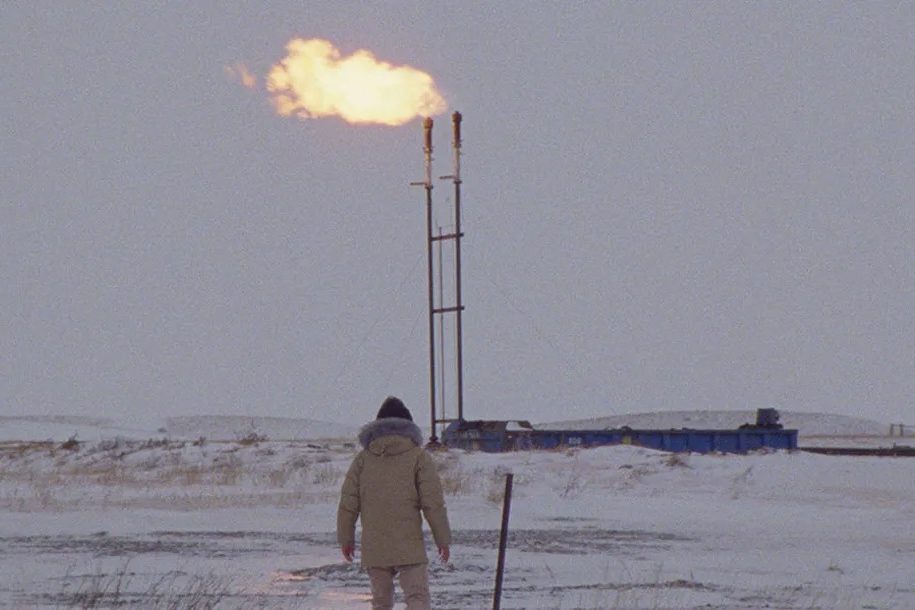Let no one fault the new film How to Blow Up a Pipeline for a lack of truth in advertising. In the fictitious account of an eight-person cell’s effort to sabotage a crude oil pipeline in western Texas, the obsessive detail of a procedural meets the ticking-clock tension of a thriller as the group carries out their tightly coordinated mission. Though punctuated by flashbacks explicating the origins that give each member of the team a personal motivation for such radical measures, the pared-down plot mostly catalogues the action of two fateful days — the careful assembly of bombs, the daring planting of said IEDs, the detonation and the not-quite-clean getaway. And goddammit, they do it. Chatting with InsideHook in Brooklyn a couple weeks before the world premiere at the Toronto International Film Festival, director Daniel Goldhaber puts it in plain terms: “The good guys win.”
He and his key collaborators (in one sign of the film’s willingness to put its collectivist ethic where its mouth is, he shares the “film by” credit with writer-producer-star Ariela Barer, writer-producer Jordan Sjol and editor Dan Garber) know the feeling. Aside from the occasional First Reformed, there’s not much subversive political messaging coming out of the American entertainment industry, the realities of production being dependent on the largesse of moneyed entities with a lot invested in preserving the status quo. Completing a call for extreme upheaval — and making it as a capital-M movie, with a multi-million-dollar budget, a cast of buzzy up-and-comers and a berth at the world’s biggest launching platform for fresh cinema — counts as a coup unto itself. Without waffling, without ideological compromise, without bullshit of any strain, they’ve envisioned a way forward for an Earth facing a dead end. In their telling, a debate that so many like to treat as complicated is reframed as bracingly straightforward heroism. Obliterating the means of pollution isn’t a tough choice between justice and the law, but as the concluding narration states, an act of planetary self-defense.
“Every single movie about progressive action is a tragedy, from Night Moves to Nocturama to Judas and the Black Messiah,” Goldhaber says. “And that’s a movie I love! But there’s a subtly conservative notion running through all these stories, which amounts to ‘Don’t try, because you will fail.’ The major thing that we wanted to feel different is that this time, they get away with it.”
Defining “they” and “it,” however, would prove a task as delicate as pouring combustible blasting powder. The 22-day seat-of-the-pants shoot in New Mexico was grueling enough with the laborious construction of a 150-foot segment of industrial-cardboard pipe (any metal would’ve made the demolition a hazard for the specialists on set), not to mention the couple days on location in North Dakota that Goldhaber recalls as “the most harrowing shoot of my life.” With wind chill at negative 50 degrees and an Omicron outbreak stranding the camera department in Denver, Sjol stepped up and made a perilous round-trip drive to retrieve them from their re-routed destination of Bismarck, continuously de-frosting the inside of windshield all the way. “I had such a bad panic attack on the plane at the end of the shoot, after not sleeping for several days, that I had to be removed just as they were about to take off,” Goldhaber recalls. “I thought I couldn’t breathe. Pretty bad.”
But the most daunting challenges were intellectual rather than practical, a matter of handling such volatile subject matter with the correct mix of delicacy and determination. The script has been liberally adapted from Andreas Malm’s book of the same name, a theoretical text now refashioned with his approval into an invented narrative, as if applying memorized mathematical formulas to solve a word problem. His principles come to life in the ensemble, their multicultural makeup conveying an urgency that unites both sides of the aisle, as well as those wanting nothing to do with aisles at all. One scene showing a meeting with a do-nothing student eco-activism group translates Malm’s frustration with the ineffectiveness of pacifism; another gives a tacit warning against the fatalism he considers equally injurious to the movement.
As in Goldhaber’s previous feature Cam (made with Isa Mazzei, a producer on Pipeline), he takes as his subjects people whose work has been deemed impermissible by the state. Head of the operation Xochitl (Barer) and her friend Theo (Sasha Lane) hail from a refinery town that’s given them a front-row seat to the ruin wreaked on the ground and sky, burnt by acid rain as children in a memory borrowed from a Texan cast member. Introduced hoovering coke off of a glowing iPhone, Logan (Lukas Gage) and Rowan (Kristine Froseth) revel in the excitement of troublemaking that comes with bettering society. (“Everyone knows that one annoying anarchist, where it’s as much a lifestyle as a belief,” Goldhaber says.) In the cleverest touch, both Native American renegade Michael (Forrest Goodluck, a movie star waiting to happen) and white rancher Dwayne (Jake Weary) feel that the government is seizing land that rightfully belongs to them. Though they differ in the finer points of their approaches and motivations, they all want the same thing, and find common ground in the effort to achieve it.
Dwayne gets what might be the film’s key scene: in a flashback, documentarians enter and rearrange his home for a patronizing interview in an attempt to “put a human face” on their environmentalist cause, only for his wife to lash out at the visitors for doing nothing to materially aid their struggling family. It’s a dose of unambiguous self-critique, a reminder that there are so many wrong ways to go about advocating for something worthy, and that making a movie only goes so far. “I’m very suspicious of conflating the work of a filmmaker with the work of an activist,” Goldhaber says. “I’m wary of anyone who says that making the movie is the act itself. I don’t think that’s even the job of filmmakers. We live in a progressively media-saturated world, where we confuse watching something for doing something. So much of our lived experience is mediated by content, and so I think that’s a natural thing to believe. But our stated goal from the beginning, after reading and being moved by the book, was to engage with these ideas.”
In their planning stages, Xochitl and her cohort carefully ensure that no one will be hurt and that the oil spillage from the rupture would be at a negligible minimum, giving the authorities nothing they can use to discredit the points being made. The minds behind Pipeline faced a similar imperative in working with hot-button philosophies that invite tough conversations about endorsement and intended impact. Starting with the warm 16mm cinematography from revelatory 25-year-old first-timer Tehillah De Castro, a rejoinder to the militaristic “cop aesthetic” of the comparably desert-set Sicario, every choice fits into a thoughtfully developed framework. Other cinematographers had proposed a black-ops look, going after “something badass” that the production team made a conscious effort to resist. “When we started, my first instinct was to make this as propaganda, because I was feeling galvanized by the book,” he says. “That’s how I came into it, feeling angry. But the process of making the movie immediately became about working against that. Jordan and Ariela immediately had strong problems with that mentality. A huge part of the writing was testing our answer to the question of why we’re making this at all, and then burying those answers in the text.”
As our interview drifts into the underpinnings of the film’s politics, Goldhaber threads a number of sensitive needles. It’s not propaganda, as he explains it, but a provocation that defies attempts to boil it down. He cites Jean-Luc Godard’s Maoist broadside La Chinoise, Michelangelo Antonioni’s counterculture freakout Zabriskie Point and the Soviet agitations of Sergei Eisenstein as inspirations, but their leaden directness is mediated by the moving-parts pleasures of Ocean’s Eleven and Tenet. Some passages of more in-depth discussion between the characters were left on the cutting room floor, serving only to slow down a fleet, no-fat nerve-shredder. “I’m trying to explicitly borrow from the formal playbook that big-budget action blockbusters have a monopoly on,” he says. The film understands the same thing that the Panthers and the Red Army Faction and the May ’68 protesters all knew: people are more likely to listen to you when you’re young, hot and stylish.
“I’m not a politician, and I’m not a spokesman,” he says. “The reason I find it’s so important to be distinct about this is that heist movies have a broad audience, and propaganda movies do not. I want this to be seen, thought about and talked about, on the level of the ideas of the movie puts forward rather than a single message it can be reduced to. I want the audience to feel good about something that they’ve been programmed by all narrative media to feel bad about. I don’t necessarily think that can be seen as the moral position of the film. Andreas is fairly clear in his writing to separate these concepts from each other. The book is an argument that calls for the destruction of fossil fuel infrastructure. I would not say that we are doing the same.”
I’ve interviewed Goldhaber once before and our dynamic is friendly, so I feel secure in rolling my eyes at this, which he meets with a “seriously!” While the script does not convey step-by-step instructions on bomb chemistry (in a passing in-joke, one character notes this as another checks out Malm’s source book) the riveting final scene makes a person want to go out and smash something with its suggestive shots of the next round of eco-terrorists wiring up a yacht. “The audience feels good about what’s been done, and they understand the moral impetus for doing it,” he says. “But that same viewer has no idea if this all works, and what the far-reaching ramifications could be, aside from propagating additional property destruction — potentially, property destruction that’s less defensible. The end sequence is reckoning with the sacrifice and emotional fallout of the act. It felt necessary, but we purposefully withheld the sum total of consequences. It’s not like they solve climate change in the world of the film. I think that’s where the movie isn’t a piece of propaganda, or just isn’t calling for this, because we don’t actually demonstrate the successful effect in a way that propaganda would.”
“The reason that I say I’m not calling for the action,” he continues, “is that you wouldn’t watch Ocean’s Eleven and walk away thinking Soderbergh’s literally calling for casinos in Vegas to be knocked over. It’s about the ideology behind it. If I’m pushing anything, it’s the book’s proposition that every social justice movement in history has disrupted civic order, and at the very least, destroyed property. The book says that we are facing an existential threat to civilization on our planet, so a moral obligation is created to disarm fossil fuel infrastructure. That’s the idea that the movie demonstrates, hopefully in the same way that bank robbery movies in the ‘40s expressed the country’s anti-bank sentiments — without necessarily exhorting anyone to go rob a bank.”
The fledgling revolutionaries can’t singlehandedly turn around decades of environmental deterioration, but they have their day, and that’s much more than nothing. For Goldhaber and his fellow producers, the completing piece of an unlikely victory still hangs in the balance. They now face the daunting prospect of selling their powder keg to a distributor that’ll bring it to the mass viewership they hope to reach. In this case, a bit of the expected controversy might be a blessing. Assured of their stance, they’re not losing sleep over whether the film goes too far or not far enough, whether it condones the irresponsible or merely warns of it, whether it foregrounds the far left or rejects orientation on a spectrum entirely. They just want to get America fired up. “It’s foolish to think, in this day and age, that I could control the narrative around this movie,” he says with a laugh.
This article appeared in an InsideHook newsletter. Sign up for free to get more on travel, wellness, style, drinking, and culture.







![Noah Wyle [third from left] with the season 2 cast of "The Pitt"](https://www.insidehook.com/wp-content/uploads/2026/01/the-pitt-season-2-schedule.jpg?resize=450%2C450)





![Noah Wyle [third from left] with the season 2 cast of "The Pitt"](https://www.insidehook.com/wp-content/uploads/2026/01/the-pitt-season-2-schedule.jpg?resize=750%2C500)









